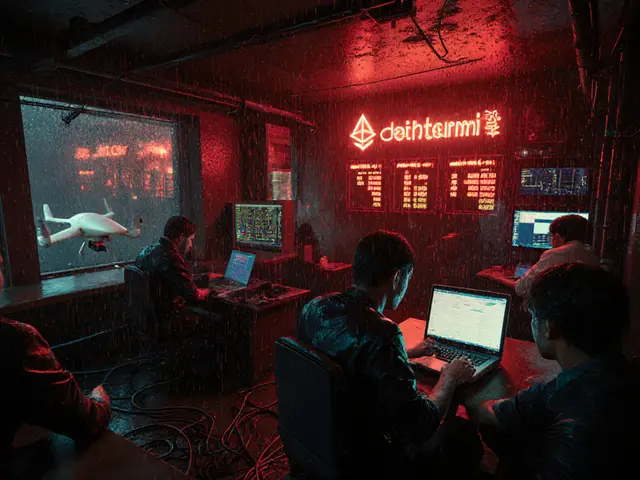Singapore Crypto Licence Calculator
Business Details
Recommended Licence Type
| Licence | Transaction Volume | Minimum Capital | Compliance Requirements |
|---|---|---|---|
| Standard Payment Institution | Up to SGD 3 million/month | SGD 100,000 | Basic AML/KYC, quarterly reporting |
| Major Payment Institution | Above SGD 3 million/month | SGD 250,000 | Advanced risk-management, annual audit, dedicated compliance officer |
| Exempt Payment Service Provider | Low-risk activities | Varies | Notification to MAS, activity-specific limits |
| Capital Markets Services (CMS) | Exchange or listing services | SGD 1 million | Asset segregation, fit-and-proper checks, stress-testing |
Singapore crypto regulation has turned the city‑state into the go‑to hub for digital‑asset firms that want clear rules without stifling innovation. Since 2020 the regulatory landscape has layered legislation, and the June2025 rollout of the Financial Services and Markets Act (FSMA) finally put every digital token service provider (DTSP) under a single licensing regime. If you’re planning to launch an exchange, a wallet service, or a stablecoin project, you need to know which licence fits your business, what capital you must set aside, and how the anti‑money‑laundering (AML) rules bite.
TL;DR
- MAS (Monetary Authority of Singapore) is the sole regulator for crypto firms.
- Two main licences under the Payment Services Act: Standard (≤SGD3M/mo) and Major (>SGD3M/mo).
- Since 30June2025, every DTSP must hold a licence under FSMA, even if it only serves overseas users.
- AML compliance is driven by the Crypto Travel Rule (MAS NoticePSN02) - full KYC, transaction monitoring and suspicious‑activity reporting.
- Stablecoin issuers need a dedicated licence, meet backing‑and‑redemption standards, and cannot use credit‑cards for purchases.
Who Regulates Crypto in Singapore?
At the heart of the regulatory architecture is Monetary Authority of Singapore (MAS), the country’s central bank and financial‑services watchdog. MAS issues licences, enforces anti‑money‑laundering (AML) standards and monitors systemic risk across all financial sectors, including digital assets.
Key Legislation: PSA and FSMA
The Payment Services Act (PSA) launched in January2020 and created a unified framework for traditional payment providers and crypto‑related services. Under PSA, digital currencies are called Digital Payment Tokens (DPTs) and are treated as legal assets.
In 2025 the Financial Services and Markets Act (FSMA) took over the licensing of digital token service providers. The change means that any firm offering token‑exchange, custody, or issuance services from Singapore - even if its customers are abroad - must apply for a licence under FSMA.
Licensing Tiers and Capital Requirements
MAS categorises crypto firms into three licence classes:
| Licence | Monthly Transaction Volume | Minimum Capital | Key Compliance Burdens |
|---|---|---|---|
| Standard Payment Institution | Up to SGD3million | SGD100,000 | Basic AML/KYC, quarterly reporting |
| Major Payment Institution | Above SGD3million | SGD250,000 | Advanced risk‑management, annual audit, dedicated compliance officer |
| Exempt Payment Service Provider | Very low‑risk activities (e.g., intra‑group transfers) | Varies - often none | Notification to MAS, activity‑specific limits, periodic monitoring |
Key points for each class:
- Standard: Ideal for small exchanges, wallet apps, or payment processors handling modest volumes.
- Major: Required for institutional platforms, high‑frequency traders, or any service crossing the SGD3million threshold.
- Exempt: Reserved for niche, low‑risk services such as intra‑company token transfers; still subject to MAS notification.

2025 Regulatory Overhaul for Digital Token Service Providers
On 30June2025 the FSMA‑based regime for Digital Token Service Providers (DTSPs) went live. The key points:
- All DTSPs operating from Singapore must hold a licence - there is no “soft‑landing” period.
- Licences are granted only in “exceptional” cases; most applicants must demonstrate robust governance, technology and capital.
- Unlicensed entities were ordered to cease operations by the deadline and face fines up to 10% of annual turnover.
- Licensees must appoint a Singapore‑resident compliance officer, conduct annual independent audits and meet heightened cybersecurity standards.
Anti‑Money‑Laundering and the Crypto Travel Rule
MAS enforces AML/CFT through Notice PSN02 (the Crypto Travel Rule). The notice obliges every DPT service provider to:
- Collect full KYC data (name, address, ID, source of funds) before onboarding.
- Monitor transactions in real‑time for structuring, rapid movement of large sums, or links to sanctioned entities.
- Submit Suspicious Transaction Reports (STRs) to the Suspicious Transaction Reporting Office within 24hours of detection.
- Maintain records for at least five years and make them available to MAS on request.
Non‑compliance can trigger licence suspension, heavy fines, or criminal prosecution.
Capital Markets Services (CMS) Licence for Exchanges
Crypto exchanges that facilitate token listings, primary issuance or market‑making must also secure a Capital Markets Services licence under the Securities and Futures Act. Requirements include:
- Minimum paid‑up capital of SGD1million for a full‑service exchange.
- Robust segregation of client assets.
- Fit‑and‑proper assessment of senior management.
- Regular stress‑testing and disclosure of systemic risk metrics to MAS.
Stablecoin Framework and Innovation
Singapore’s stablecoin rules sit alongside the broader crypto regime. The key elements are:
- Issuers must obtain a licence and prove that each token is fully backed by fiat or approved digital assets.
- Redemption rights must be honoured on demand, and the backing portfolio must be audited quarterly.
- Credit‑card purchases of stablecoins are prohibited to curb consumer leverage.
- MAS monitors cross‑border stablecoin flows to ensure compliance with AML standards.
Practical Checklist for Crypto Firms Entering Singapore
- Identify the correct licence class (Standard, Major, Exempt, DTSP, CMS).
- Prepare capital - SGD100k minimum for Standard, SGD250k for Major, higher for CMS.
- Hire a Singapore‑resident compliance officer and set up AML/KYC software that meets PSN02.
- Draft internal policies for cybersecurity, data protection and business continuity.
- Submit the licence application via MAS’ online portal, attaching governance, technology and financial statements.
- Plan for annual independent audits and ongoing reporting (quarterly AML reports, annual CMS returns).
- If launching a stablecoin, set up a separate escrow account and arrange quarterly third‑party audits.
Following this list reduces the risk of costly delays and helps you hit the market faster.

Frequently Asked Questions
Do I need a licence if I only serve foreign customers from Singapore?
Yes. The 2025 FSMA regime applies extraterritorially - any DTSP operating out of Singapore, even if all users are abroad, must obtain a licence.
What is the difference between a Standard and a Major Payment Institution licence?
The Standard licence caps monthly transaction volume at SGD3million and requires SGD100k capital, while the Major licence covers any volume above that threshold and demands at least SGD250k plus advanced risk‑management controls.
How does the Crypto Travel Rule affect my AML program?
Under NoticePSN02 you must collect full KYC data, monitor every transaction for suspicious patterns, and file STRs within 24hours. Your system needs to log and retain this data for at least five years.
Are stablecoins treated the same as other crypto tokens?
Stablecoins have a separate licensing track. They must be fully backed, undergo quarterly audits, and cannot be purchased with credit cards, whereas other DPTs follow the general PSA/FSMA rules.
What penalties apply for non‑compliance with MAS regulations?
MAS can impose fines up to 10% of annual turnover, suspend or revoke licences, and in severe cases pursue criminal charges against responsible individuals.
Can I operate a crypto exchange without a CMS licence if I only serve retail customers?
No. Any platform that lists tokens for public trading or provides market‑making services must hold a Capital Markets Services licence, regardless of client type.





Comments
17 Comments
Marie-Pier Horth
Wow, the Singapore framework reads like a meticulous symphony of rules, each note humming with intent. It reminds me that order can be a form of art, even for crypto. The layers of licensing feel like a staircase, each step demanding more discipline. Yet the promise of clarity shines through the bureaucracy.
Gregg Woodhouse
i dunno why we gotta read all that, just pick a licence and go. u cant even tell me the diff between standard and major lol.
F Yong
The sheer elegance of these regulations is almost theatrical-who wouldn't love a government script for every token? One can only imagine the hidden hands pulling the strings behind MAS. Yet the public gets a front‑row seat to the performance.
Sara Jane Breault
Take a deep breath and break the guide down step by step. Start with identifying your transaction volume, then match it to the Standard or Major licence. Remember, a solid compliance officer is your safety net, so hire one early.
Anurag Sinha
When I first saw the 2025 FSMA rollout I felt a chill down my spine, as if the powers that be were setting a digital trap. The licence tiers look innocent, but hidden clauses whisper about data sharing with undisclosed agencies. Every crypto firm now must appoint a Singapore‑resident compliance officer, a role that could easily become a mole for foreign intel. Capital requirements are not just financial buffers; they are a method to filter out smaller innovators and keep the market under elite control. The crypto travel rule forces providers to collect exhaustive KYC data, effectively creating a massive personal database. What many don’t realize is that MAS can request this database at any moment, bypassing typical judicial oversight. Stablecoin issuers are forced into separate licences, a move that some say is aimed at preventing competition with the sovereign digital currency. The prohibition on credit‑card purchases for stablecoins feels like a subtle ban on everyday users, steering them toward regulated banks. I also noticed that the audit schedule aligns perfectly with quarterly fiscal reports from major banks, hinting at synchronized oversight. The requirement for quarterly third‑party audits creates a lucrative market for a handful of approved firms, consolidating power. If you think the extraterritorial reach is benign, remember that any DTSP serving foreign customers still falls under MAS jurisdiction. This means that a simple wallet app in a distant country could be shut down overnight if a single report flags it. There are rumors circulating that some of the AML algorithms are fed by hidden AI models trained on global surveillance data. All of this builds a picture where the regulatory framework is less about protecting users and more about building a state‑controlled crypto ecosystem. So while the guide looks helpful, keep your eyes open, your code clean, and your compliance team ready for surprises.
Raj Dixit
The nation must protect its financial sovereignty, and these rules are a shield. Ignoring them will only invite chaos.
Nilesh Parghi
Imagine a garden where each plant is a crypto service; the licence is the gardener’s pruning shears. Without proper care, the weeds of risk will overrun the plot. So tend your compliance as you would nurture a delicate bloom.
Adeoye Emmanuel
Step into the arena of Singapore's crypto scene with confidence, armed with knowledge and a keen eye. The checklist is your sword, the capital requirement your armor. Remember, thorough AML procedures are the bright lantern that guides you through the night of uncertainty. Embrace the challenge, for every hurdle is a chance to prove your resilience.
Rahul Dixit
The regulators act like gatekeepers of a digital empire, deciding who may enter our financial borders. Any dissenting token is treated as a potential threat to national stability. It’s a clear message: only the vetted shall thrive under the flag of compliance.
CJ Williams
Wow!!! This guide is like a treasure map 🗺️, leading us through the maze of licences!!! Make sure you read every line, double‑check the capital numbers, and never forget the AML checkpoints!!! 🚀
mukund gakhreja
Look the guide is long but you can handle it just take it step by step and dont worry if you miss a detail you will learn as you go and eventually get it right
Michael Ross
Regulations are clear, follow them.
Deepak Chauhan
One might argue that the rigor of Singapore's framework mirrors the discipline of ancient scholars, yet it speaks in a language accessible to today's developers. In that spirit, let us embrace the structure while retaining our creative spark :). The balance between order and innovation is where true progress lies.
Henry Mitchell IV
Sure, read the whole thing if you have time 😐 but you can skim the licence table for the basics.
Kamva Ndamase
Listen up, crypto crusaders! The Singapore rulebook is a labyrinth of fire and steel, and only the fiercest will emerge unscathed. Dive in, adapt, or be swallowed by the regulatory beast!
Marie Salcedo
Great job on digging through this material! Keep that momentum, and the licensing maze will soon feel like a simple walk in the park. Remember, every step forward builds your confidence.
Narender Kumar
Esteemed colleagues, the advent of the 2025 regulatory edifice signifies a pivotal epoch in our digital finance odyssey. One must accord due reverence to the meticulous statutes that now govern token commerce. Let us therefore embark upon this venture with solemn diligence and unwavering resolve. May our enterprises flourish within the bounds of propriety.
Write a comment